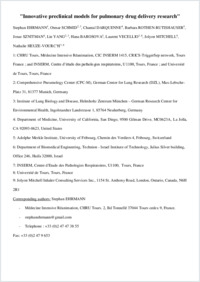Innovative preclinical models for pulmonary drug delivery research
- Ehrmann, Stephan CHRU Tours, Médecine Intensive Réanimation, CIC INSERM 1415, CRICS-TriggerSep network, Tours France
- Schmid, Otmar Comprehensive Pneumology Center (CPC-M), German Center for Lung Research (DZL), Max-Lebsche-Platz 31, 81377 Munich, Germany - Institute of Lung Biology and Disease, Helmholtz Zentrum München – German Research Center for Environmental Health, Ingolstaedter Landstrasse 1, 85764 Neuherberg, Germany
- Darquenne, Chantal Department of Medicine, University of California, San Diego, 9500 Gilman Drive, MC0623A, La Jolla, CA 92093-0623, United States
- Rothen-Rutishauser, Barbara Adolphe Merkle Institute, University of Fribourg, Chemin des Verdiers 4, Fribourg, Switzerland
- Sznitman, Josue Department of Biomedical Engineering, Technion - Israel Institute of Technology, Julius Silver building, Office 246, Haifa 32000, Israel
- Yang, Lin Comprehensive Pneumology Center (CPC-M), German Center for Lung Research (DZL), Max-Lebsche-Platz 31, 81377 Munich, Germany - Institute of Lung Biology and Disease, Helmholtz Zentrum München – German Research Center for Environmental Health, Ingolstaedter Landstrasse 1, 85764 Neuherberg, Germany
- Barosova, Hana Adolphe Merkle Institute, University of Fribourg, Chemin des Verdiers 4, Fribourg, Switzerland
- Vecellio, Laurent INSERM, Centre d'Etude des Pathologies Respiratoires, U1100, Tours, France - Université de Tours, Tours, France
- Mitchell, Jolyon Jolyon Mitchell Inhaler Consulting Services Inc., 1154 St. Anthony Road, London, Ontario, Canada, N6H 2R1
- Heuze-Vourc’h, Nathalie INSERM, Centre d'Etude des Pathologies Respiratoires, U1100, Tours, France - Université de Tours, Tours, France
-
02.04.2020
Published in:
- Expert Opinion on Drug Delivery. - 2020, vol. 17, no. 4, p. 463–478
English
Introduction: Pulmonary drug delivery is a complex field of research combining physics which drive aerosol transport and deposition and biology which underpins efficacy and toxicity of inhaled drugs. A myriad of preclinical methods, ranging from in- silico to in-vitro, ex–vivo and in-vivo, can be implemented.Areas covered: The present review covers in-silico mathematical and computational fluid dynamics modelization of aerosol deposition, cascade impactor technology to estimated drug delivery and deposition, advanced in-vitro cell culture methods and associated aerosol exposure, lung-on-chip technology, ex–vivo modeling, in-vivo inhaled drug delivery, lung imaging, and longitudinal pharmacokinetic analysis.Expert opinion: No single preclinical model can be advocated; all methods are fundamentally complementary and should be implemented based on benefits and drawbacks to answer specific scientific questions. The overall best scientific strategy depends, among others, on the product under investigations, inhalation device design, disease of interest, clinical patient population, previous knowledge. Preclinical testing is not to be separated from clinical evaluation, as small proof-of-concept clinical studies or conversely large-scale clinical big data may inform preclinical testing. The extend of expertise required for such translational research is unlikely to be found in one single laboratory calling for the setup of multinational large-scale research consortiums.
- Faculty
- Faculté des sciences et de médecine
- Department
- AMI - Bio-Nanomatériaux
- Language
-
- English
- Classification
- Biological sciences
- License
-
License undefined
- Identifiers
-
- RERO DOC 329900
- DOI 10.1080/17425247.2020.1730807
- Persistent URL
- https://folia.unifr.ch/unifr/documents/309123
Statistics
Document views: 148
File downloads:
- pdf: 420
